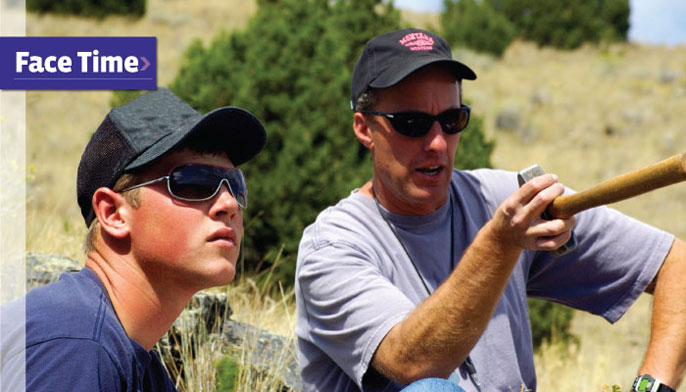
Rob Thomas' (holding hammmer) push to move away from the "sage on the stage" form of learning has worked wonders at the University of Montana Western.
Who: Rob Thomas, '93
Known as: Geology Professor, University of Montana Western
Known for: Revolutionizing undergraduate education
The epiphany came when Rob Thomas overheard four students talking in a school hallway, deciding who would go to English class and take notes to share with the group. Who would go to math? Who would go to history? "I realized," he says from his office in Dillon, Mont., "that we were just teaching students to take notes. They didn't even need to attend class. They weren't very passionate about learning."
Besides, he asked, "what can you do with a 50-minute class that meets three days a week? Students are trying to juggle five or more classes at the same time, causing panic as they try to decide whether to study for a chemistry test or write a report for their history class.
"I decided we needed to change that."
Did he ever. Thomas was named the 2009 Outstanding Baccalaureate Colleges U.S. Professor of the Year by The Carnegie Foundation for the Advancement for Teaching and the Council for Advancement and Support of Education for helping the University of Montana Western become the first public university in U.S. history to adopt an immersion scheduling system where students take one course at a time for 18 days.
The results?
"Stunning," says Thomas, who earned his Ph.D. in geology from the UW in 1993 and has been teaching for 18 years.
In the four years since the University of Montana Western became the first public institution of higher education to use the "block" system, first-year student retention jumped from 58 percent to 78 percent. Student transfers are up by 25 percent, and out-of-state applications have increased.
U.S. News & World Report even ranked the school as the No. 2 college in the U.S. on a list of "Colleges that Offer Small Classes on a Budget"—impressive for a former state teachers college that had never been ranked by anyone for anything.
Instead of spending all day in a classroom, Thomas now takes his students out into the field, where they are applying their lessons to real-world problems, such as assessing fluvial Arctic grayling habitat restoration on the upper Big Hole River in southwestern Montana. Students spend up to six hours a day outdoors with Thomas, collecting information and constructing professional reports that will be used by government agencies to assess whether the restoration effort is working.
"I call this aboriginal learning," says Thomas, a California native whose summer trips to national parks inspired his passion for geology. "It's not for everyone, but for students who are engaged in their education, it is real learning. Students need mentorship, and our school is filling an important niche in American higher education."
Gone are the days when after a few weeks of a semester class, nearly half of the students would disappear and not show up again until midterm examinations.
"Now, students spend their time working with professors on real projects that challenge them to learn practical skills while using the data they gather to solve actual problems," says Thomas, who will be taking a class to Yellowstone National Park in the near future. "They build portfolios with examples of what they can actually do.
"During these hard economic times, documentation of professional skills provides a tremendous advantage over a transcript listing of classes."
Thomas—whose parents did not attend college—credits his creative colleagues for the success of the program, which is called "Experience One."
"This has been a rejuvenating experience for all of us," Thomas says. "The change is paying off. Students are really learning. And that's why we are in this."
—Jon Marmor is managing editor of Columns.